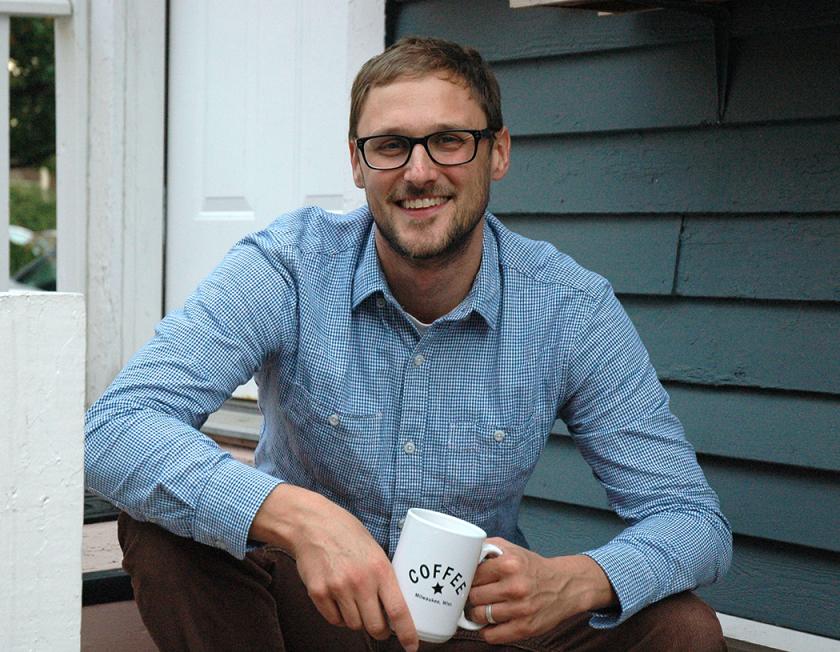
 Before beginning his studies at GSLIS, Jarrett Dapier already had several years of experience working at the Evanston Public Library (EPL), where he developed and implemented creative programs to engage teens in reading and self-expression. Last summer, while in his role at EPL, he worked with the Dajae Coleman Foundation to implement programming centered around How Long Will I Cry?, a history of youth violence in the Chicago area; e.g., readings and group discussions, a talk by a representative of Cure Violence, and a theater performance by teen readers. Dapier is now enrolled as a full-time master’s student in the LEEP online option, and he is the recipient of the Lionelle L. Elsesser Fellowship.
Before beginning his studies at GSLIS, Jarrett Dapier already had several years of experience working at the Evanston Public Library (EPL), where he developed and implemented creative programs to engage teens in reading and self-expression. Last summer, while in his role at EPL, he worked with the Dajae Coleman Foundation to implement programming centered around How Long Will I Cry?, a history of youth violence in the Chicago area; e.g., readings and group discussions, a talk by a representative of Cure Violence, and a theater performance by teen readers. Dapier is now enrolled as a full-time master’s student in the LEEP online option, and he is the recipient of the Lionelle L. Elsesser Fellowship.
Why did you decide to pursue an LIS degree?
For years, my mentor in teen services at the Evanston Public Library encouraged me to pursue graduate work in LIS, but I always resisted. I wondered, “What do I need a master’s degree for, if I’m already doing work in a great teen services department?” Then, after five years, I began to think more deeply about library work. I realized that I couldn’t become a true professional without a solid theoretical, historical, and analytical understanding of library and information science. As a musician, this made intuitive sense: instincts, self-teaching, and playful experimentation can only take one so far. To truly grow, one needs to work hard to understand the bedrock principles. This means listening to—and being challenged by—those who have vaster knowledge and experience.
Why did you choose GSLIS?
Some of the most creative, intelligent, and social justice-minded library professionals I know are GSLIS grads. The pride they feel for having attended GSLIS, the relationships with faculty and peers they have built during their studies here, and the enthusiasm with which they encouraged me to apply suggested that this is a school that values community. That's incredibly important to me. I wanted to be challenged by a rigorous program, but I didn’t want to do it in isolation.
Illinois is my alma mater (BA ’01), so I am familiar with the high quality of intellectual life offered here. Resources on campus like the Center for the Children’s Book and the university’s world-class libraries are astounding in their richness. And Champaign-Urbana is a truly special place with a unique arts community and a bevy of die-hard public library supporters. It’s an inspiring place to learn.
What particular LIS topics interest you most?
I plan to focus my studies at GSLIS on those courses that will help me broaden my understanding of youth library services. I want to explore the role of public libraries in strengthening emergent literacy, the potential for library-neighborhood partnerships in building intergenerational communities of readers, and programs for serving traditionally underrepresented populations such as youth with disabilities, teen parents, and adolescent males. Other interests (that also apply to youth services) include intellectual freedom and censorship, privacy in the digital age, community informatics, oral history, and book arts.
You are a recipient of the Elsesser Fellowship. What impact has that award had on your educational experience?
 The Elsesser Fellowship has allowed me to study LIS full time and immerse myself in course work in a way that I would not have otherwise been able to do. The financial support is a great relief to my young family and me. I am humbled by the Elsesser’s desire to give back and support the next generation of library and information professionals.
The Elsesser Fellowship has allowed me to study LIS full time and immerse myself in course work in a way that I would not have otherwise been able to do. The financial support is a great relief to my young family and me. I am humbled by the Elsesser’s desire to give back and support the next generation of library and information professionals.
What do you do outside of class?
I love to bike around Evanston with my family, practice drumming, run along Lake Michigan, and go out for French food with my wife whenever I can. I have also been tearing through a lot of comics, especially those that depict non-Western life. I recently read Barefoot Gen by Keiji Nakazawa, which wrecked me emotionally in ways I’ve only experienced a handful of times in my reading life.
What career plans or goals do you have?
I would like a leadership role in a teen services department at a public library, preferably in a diverse community, where I can bring my ideas for empowering teens to bear. I am particularly interested in helping found a new teen space that includes a digital media lab, performance space, and an all-purpose workshop where teens can fix bikes, hack their prom dresses, or build their own books. Information literacy, including the ethics of information use, is an incredibly pressing area of knowledge for teens today, and I want to make that a central part of my work with them. Above all, I want to inspire youth through the democratic work of public libraries to be life-long readers committed to building ethical communities and a caring world.